
31 minute read
News from Northern Ireland
Progress with Redress in Northern Ireland Frank and Judith Marshall joined Philippa White at Tuart Place on 17 February for a Skype meeting with Brendan McAllister, Interim Advocate for Victims/Survivors of Historical Institutional Abuse in Northern Ireland, and his colleague Claire Campbell.
The meeting provided a chance to talk with Brendan about the progress of NI’s redress scheme, particularly as it will affect former child migrants living in Australia.
Advertisement
Frank and Judith, respectively Vice-President and Secretary of the Tardun old Boys Association Inc, raised questions on behalf of their members, and voiced concerns about the lengthy delays in establishing a redress scheme in Northern Ireland, pointing out that many people have died waiting for justice.
Brendan acknowledged the delays and said he expected that the Redress Board would be open for applications in March, with the first payments expected to be issued in May/June 2020. This is welcome news indeed.
We were also pleased to learn that the Redress
Board who will deal with the applications will have access to the records from the HIAI Statutory Inquiry. This includes evidence from former child migrants who gave evidence to the Inquiry when it visited Australia in 2013/14.
Brendan also confirmed that the spouse or children of eligible survivors who died on or after 28 April 1953 will be able to claim under the scheme.
During the course of our meeting, Brendan outlined eight key areas of need he had found among NI survivors of historic institutional abuse: Welfare needs, Health – mental and physical, Social support and connection, Documents and family tracing, Accountability of institutions, Restitution, Acknowledgement and apology, and Reconciliation. These eight areas sound very familiar to us, and perhaps they are universal.
We look forward to further conversations with Brendan and his colleagues as the scheme develops.
If you would like to receive the HIA Interim Advocate’s newsletter by email, contact info@hiaadvocate.org.uk News from Northern Ireland HIA Interim Advocate Brendan McAllister Judith & Frank Marshall joined Pip at Tuart Place for a Skype meeting with Northern Ireland

Boundaries workshop
by Roslyn H.

11 Roslyn (centre) with fellow participants I have been coming to Tuart Place for a few years now.
I think of it as a safe harbour from a sometimes mentally stormy world. The staff are very nice and respect everyone’s personal space. Whether you feel like chatting or not, they are always welcoming.
I always feel so comfortable when I walk through the doors because I can just be me.
On Wednesdays, Susy Vaughan runs a group session from 10:30 to noon. If you don’t feel like talking you simply say ‘pass’, and it moves onto the next person. There is no pressure to talk - the choice is all mine and everyone understands.
At Susy’s group on 29 January 2020 we talked about personal boundaries, which was very helpful to me on many different levels. We learned how negative childhood experiences can affect personal boundaries, and about respecting others’ boundaries, as well as our own.
Thank you, Susy, for such an amazing session and I look forward to future topics.
Lives in limbo as survivors ‘wait to be believed’
It’s been one year since WA became active in the National Redress Scheme, and a year since changes were made to WA’s civil laws on child sexual abuse claims.
One thing that has emerged above all else during this time is that the long delays are a killer.
The distress and re-traumatisation of survivors engaging in historic abuse claims is a little-understood area. Survivors suffer. Badly. No matter how much support is provided, post-trauma symptoms are triggered by the application process; and survivors’ number one fear – not being believed – is a gnawing and ever-present reality as they wait for their personal childhood abuse to be assessed.
The following scenario was compiled with feedback received from many, many survivors, and is typical of the common experience in applying for redress.
Imagine: you were abused as a child in an institution; your family network was fractured or non-existent; and the path your life has taken is an extension of your early trauma, abuse and neglect.
Along comes a royal commission, and then a redress scheme. The news coverage is relentless – one story after another – triggering savage memories and flashbacks; yet also raising hopes that perhaps this could be a way for your abuse to be acknowledged and compensated (as far as money can ever do that).
The amounts they offer seem a lot – you’re on a pension and living week-to-week. It’s hard to trust anyone – especially ‘the system’ – but, eventually, you decide to apply. It’s tough. You get good support from a counsellor who fills out the 40-page application form, but the process is still distressing and traumatic. Of course it is.
The application goes in. And you wait. And wait. And wait. Your most personal and painful memories have been sent off to a faceless assessor, and you now a Reference Number. A bit like Centrelink really.
No one hears anything for ages. You don’t like to ask. Doubts begin to surface, and you wonder why it’s taking so long. Don’t they believe me? Are they going to say I’m mistaken – or lying? Your long-buried bad memories are closer to the surface now. You cry and/or get angry more easily and often. Things weren’t great before the redress scheme, but at least you knew where you stood. Now you’re thinking and worrying about the money. Of course you are.
You can’t help wondering how much it will be: Will it mean I can get a decent car, or just cover the cost of fixing the old one? Will it be enough to fix my teeth? Will there be enough to give the grandchildren? How much will I get? If only I had it now. Life is in limbo and the future is on hold.
12 As of 3 January 2020, 5,829 applications had been received, but only 975 payments made under the National Redress Scheme.
An early ‘selling point’ of this scheme was a three-month turnaround on applications, but the current waiting time is more than 12 months, which is far too long – especially as many applicants are elderly and in poor health. It is important to have redress schemes, but keeping people waiting in a painful state for a year or more is nothing short of re-abuse.
We know that redress can have positive and healing outcomes for the applicants, and help people feel heard, believed and recognised – but lengthy delays are causing further pain and suffering to survivors.
The current civil claims process is also very slow, and it is imperative that more timely and compassionate processes are adopted by the District Court of WA. Amending the law is not helpful to survivors if its procedures cause further unnecessary pain and anguish.
What can we do?
If you’re an applicant or claimant, talk to someone about how it’s affecting you. You are certainly not alone. Survivors often think there is something wrong with them if they have flashbacks or feel bad while they are applying for redress. Not so – you are having a normal reaction to an abnormal and stressful process.
Talking about it helps. Attend a support group, talk to a counsellor, or a friend - anyone you trust.
Advocates and those who work in this area must also speak out. It is totally unacceptable for survivors of institutional abuse to be subjected to yet more harm by yet another ‘system’.
Across the world there is growing recognition that redress schemes can cause harm to applicants – as thousands were harmed in Redress WA, and in other notorious schemes overseas.
How will history look back on Australia’s national scheme? Will we eventually need another scheme to compensate the damage done by this one?
Only time will tell.
Parliamentary inquiry into the implementation of national redress
The Joint Select Committee on Implementation of the National Redress Scheme has begun its inquiry program with a series of public hearings around Australia, which commenced in Canberra on 26 February 2020.
Committee Chair Senator Dean Smith said hearing from survivors and those who are navigating the process of applying to the National Redress Scheme will be a key focus for the Committee.
“The hearings will provide a range of opportunities for survivors to tell the Committee, in their own words, what is working and what is not with the National Redress Scheme,” Senator Smith said “as well as any other issues that they would like to tell the Committee.”
“We invite those who would like to appear to contact the Committee at redress@aph.gov.au to register their interest.” Senator Smith said.
Public hearings will be held in Perth on 15-16 April 2020.
For more information, visit the Committee’s website at https://tinyurl.com/JSCNRS or ask a Tuart Place staff member.
The Yokai Stolen Generations Redress Forum held at Derbarl Yerrigan on 21 January this year was very well attended by WA Stolen Generations Aboriginal Corporation (WASGAC) members and spokespeople from a range of agencies and legal services working with hundreds of Aboriginal and non-Aboriginal people who qualify for National Redress payments and counselling.
The event, organised by WASGAC Managing Director Jim Morrison was also attended by people who either represented themselves or family members abused as children in institutions.
Susy Vaughan represented Tuart Place at the Forum, and said it was clear from the feedback and questions that there is a lot of confusion, anger and frustration related to waiting times, inadequacies and unfair provisions of the National Redress Scheme.
Susy caught up with representatives from the many agencies with which we collaborate, and found that all are experiencing similar problems with the scheme. Jim Morrison with Shirley Voss at a national redress information session at Tuart Place in February 2019

Jim Morrison said that subsequent work by WASGAC will include a response to governments regarding redress and healing.
Journal article: Kathleen Daly & Juliet Davis unravel the National Redress Scheme
‘Unravelling Redress for Institutional Abuse of Children in Australia’ traces the evolution of the National Redress Scheme from the trauma-informed and survivor-focused model recommended by the Royal Commission in 2015, to the compromised, inferior scheme that eventuated three years later.
Written by redress experts Kathleen Daly and Juliet Davis, this important article appeared in the University of NSW Law Journal in November 2019. Daly and Davis’ article details the twists and turns of legislative changes, government statements, and media stories. It charts the parliamentary processes that culminated in the scheme’s commencement in mid-2018 and analyses the shifting views on 17 contentious matters. Constitutional limits on federal power meant that federal and state governments had to negotiate, resulting in significant compromises in key areas of the scheme.
In the process, the redress scheme unravelled: 14 of the 17 matters shifted away from the Royal Commission’s recommendations and redress principles.
Daly and Davis point out that future changes to the scheme would require substantial renegotiation and a shift in position on increased costs.
The full article can be accessed at https://tinyurl. com/LawJnlArticle
It was standing room only at Rebecca (Bec) Moran’s presentation of her PhD research on survivors’ experiences of engaging with the Royal Commission into Institutional Responses to Child Sexual Abuse, hosted by Tuart Place on 21 October 2019.
Bec interviewed 26 survivors during her research, asking about the Royal Commission process, and the ways in which participating has affected their lives. Many of Bec’s interviews were conducted with survivors at Tuart Place, where she sought feedback on the experience of making a ‘victim submission’.
Bec’s early findings show that people who found making a submission to be a healing experience generally felt they had been heard, believed, valued and respected throughout the process.
Survivors who reported being retraumatised and distressed by participating in the Royal Commission felt that the experience echoed earlier responses to disclosure, leaving them feeling unheard, disbelieved, unwelcome and unsupported.
There was huge interest from across the sector in Bec’s presentation at Tuart Place. It was attended by more than 80 people, including survivors, service providers, academics, and representatives from other agencies working with survivors of child sexual abuse.
Bec’s research has valuable implications for services working with survivors – particularly those engaging with processes that are by their nature more challenging than the Royal Commission, such as civil claims or redress applications.
Three articles authored by Bec for New Zealand’s Royal Commission of Inquiry into Abuse in Care, (2018-2023), draw on the findings of her research to date: Hope, trust and meaning; Accessibility and ‘fitting’; and Belief and recognition.
The three-part series starts at this link: https://tinyurl.com/NZRCforum A video recording of Bec’s presentation at Tuart Place, filmed by Dr Linda Blagg, is available on our YouTube channel at https://youtu.be/svBBDndxmbs knowmore Legal Service’s Principal Solicitor Prue Gregory and members of the Perth knowmore team at Bec’s presentation
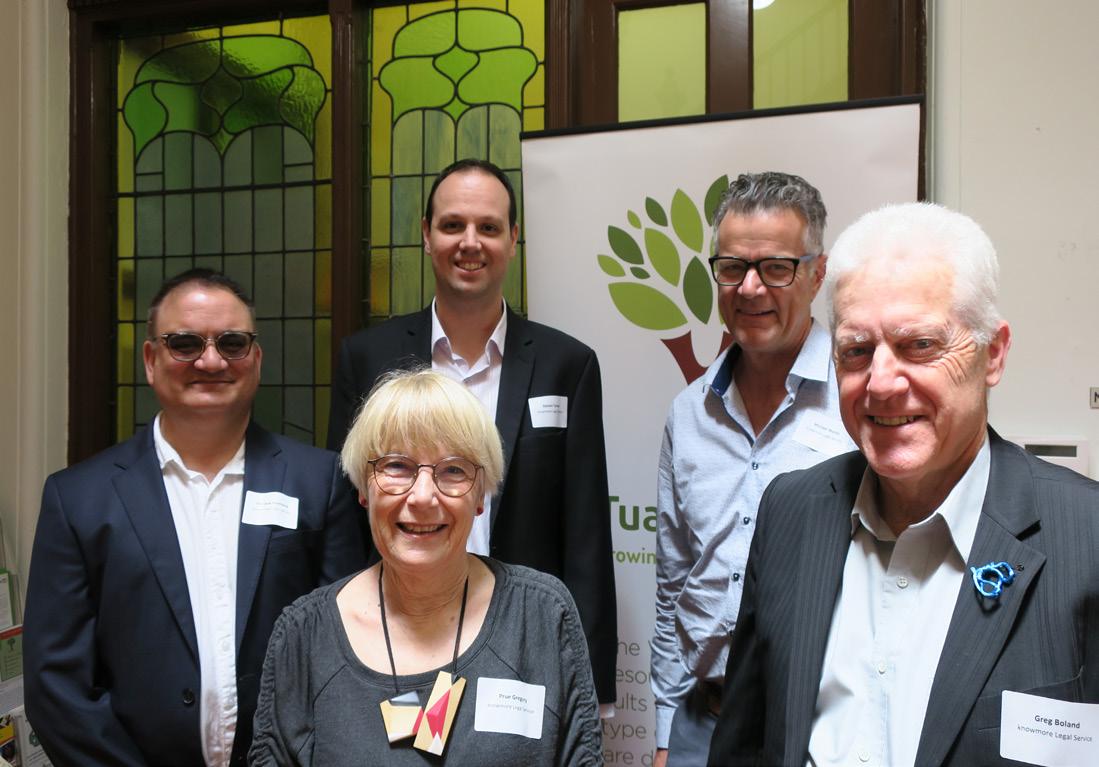
Tuart Place Q&A session on National Redress with the State Coordination Unit
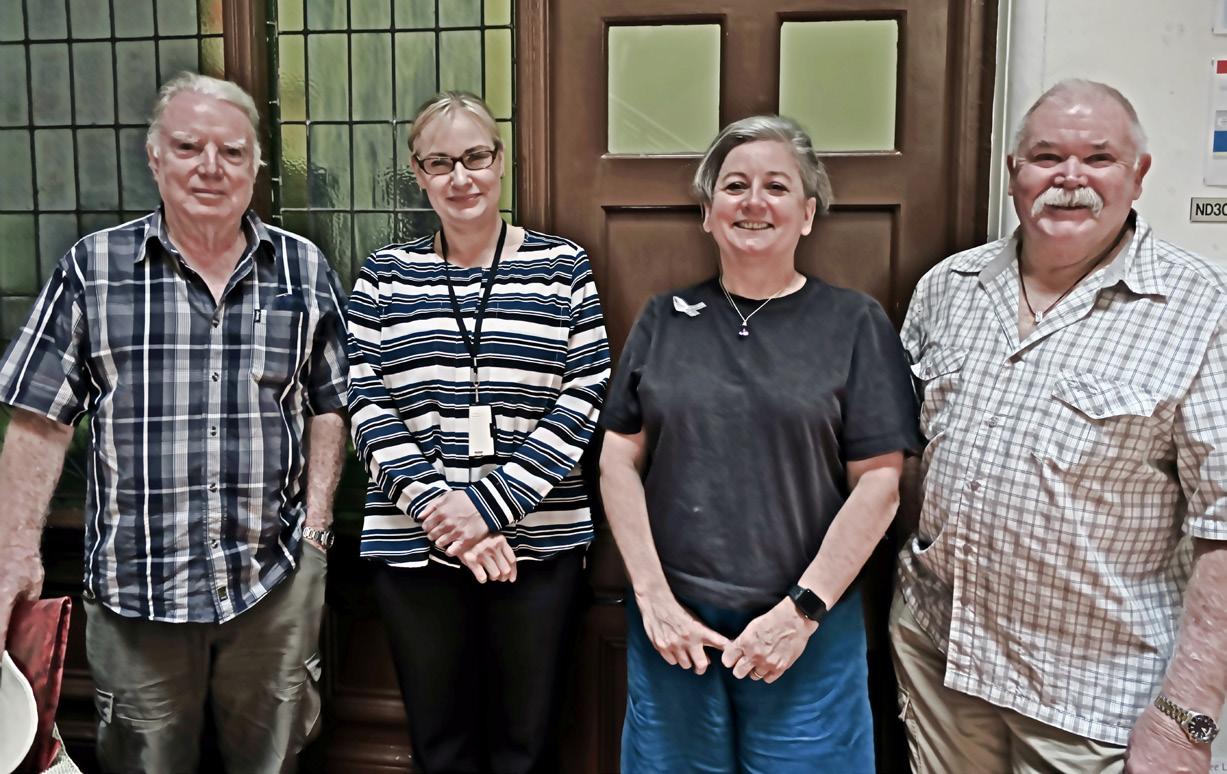
Victims of Crime A/Commissioner Kati Kraszlan and four members of the State Coordination Unit for the National Redress Scheme attended a Question and Answer session at Tuart Place in November 2019.
The Redress Coordination Unit has been established within the Office of the Commissioner for Victims of Crime, Western Australian Department of Justice, to support the WA Government’s participation in the National Redress Scheme.
After a short presentation on their work, Kati and colleague Dr Francesca Bell took questions from the floor and received feedback from the many survivors and participants who attended this session. The discussion was lively and at times emotional.
knowmore Legal Service’s Perth office is now offering free financial counselling to people engaging with the National Redress Scheme.
Financial counsellor Miranda McReynolds, who started with knowmore in December 2019, can provide advice about the effect of lump sum payments on Centrelink benefits and advice on debts. Miranda can also help in situations where elder abuse is occurring or likely to occur.
We were pleased to welcome Miranda and knowmore Perth’s Managing Lawyer Greg Boland to Tuart Place in February this year, when they provided an information session on the new service. It was a chance for participants to ask questions and get an idea of what assistance is available.
Find further information on the knowmore website at https://knowmore.org.au/services/financial-counselling/ Note: There is an important difference between seeing a financial counsellor for financial problems and seeing a financial advisor for advice on how to manage or invest money. Helpful guidelines are available from the WA Government ‘Moneysmart’ website at https://tinyurl.com/govtadvice
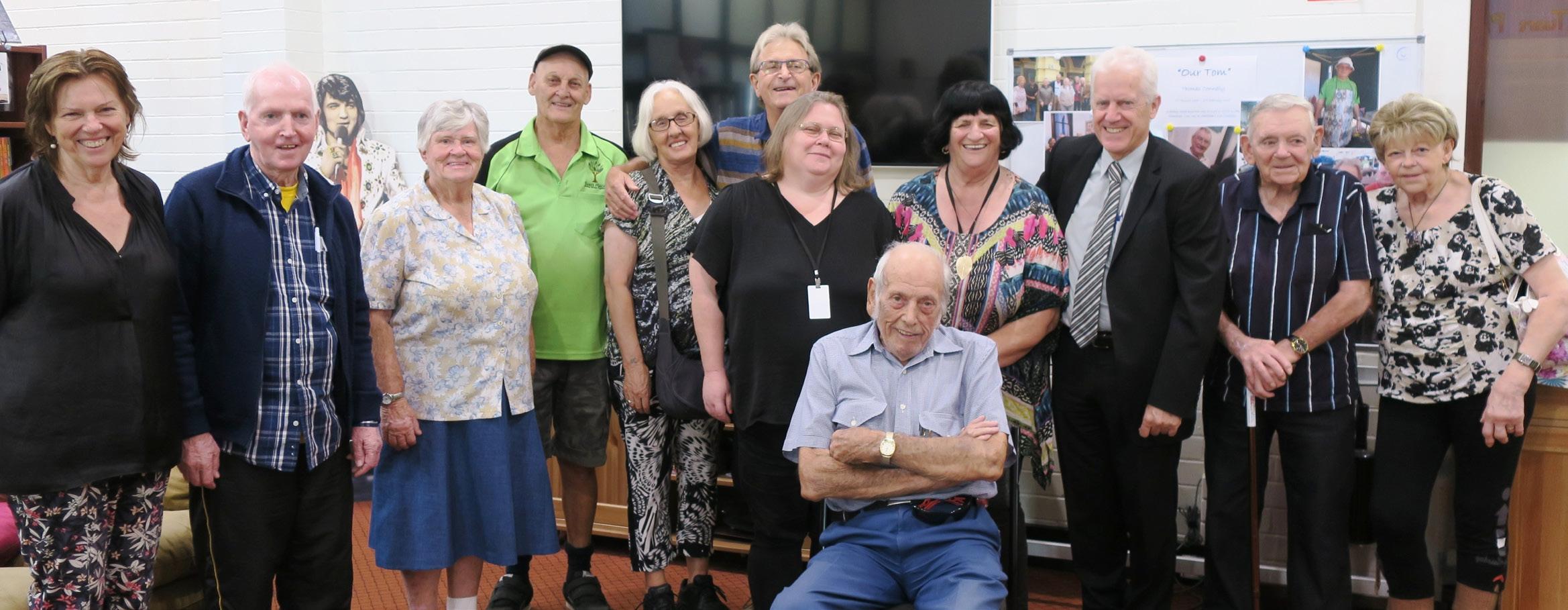
knowmore Legal Service Level 5, 5 Mill Street Perth WA 6000 Free advice line: 1800-605-762 web: www.knowmore.org.au
Financial Counsellor Miranda McReynolds (on left) with Greg Boland and Pip White

At Tuart Place in February 2020
It was clear from the discussion that survivors are being retraumatised by deficiencies in the design and implementation of the National Scheme – including its lack of transparency, unreasonable waiting times, and overly complicated application process.
Office Bearers from the Old Fairbridgians Association (WA), Richard Hinch and Graham Bennett, were present at the session and raised the issue of the unacceptable delay in ‘funder of last resort’ arrangements being put in place for the former Kingsley Fairbridge Farm School, Pinjarra, which was one of the largest Children’s Homes in WA.
OFA and Tuart Place continue to advocate for resolution of this problem.
We appreciate the openness and communication, and local-level support provided by Kati, Francesca and the WA Coordination Unit. It is particularly important for a national scheme to offer survivors a point of face-to-face contact locally.
Following on from the Q&A session in November last year, the WA team is making regular visits to Tuart Place and is available for in-person consultations.
Contact Vicky at Reception for dates and appointment times.
Brian Tennant AM, JP 10-4-1935 – 14-8-2019

Brian Tennant was an Aboriginal Australian who grew up at Castledare and Clontarf. He was a Justice of the Peace and a legendary social justice campaigner, awarded an AM in 2015 for service to the community.
Brian died suddenly, after returning from a trip to Croatia, where he had visited his father’s grave for the first time.
Brian (84) dedicated his life to helping other people, often taking up, and winning, seemingly ‘hopeless causes’.
Anthony (Tony) Dalton 27-3-1938 – 30-10-2019
Tony Dalton was a child migrant from Scotland who arrived in Australia in 1947 aboard the Ormonde. He was sent to Castledare and Clontarf, and remained living in the local area all his adult life.
Tony and his beloved wife Monica were committed community members and Tony was well-known and loved in his local neighborhood. He is fondly remembered by us all. Our condolences to Erica, Joanna and Robert.
Veronica (Vicky) Camilleri 16-6-1959 – 8-12-2019
In loving memory of my baby sister Veronica. I miss you so much and will always love you. Rest in Peace my baby sister.
Thank you to Tuart Place for all the help and support you gave to Vicky.
Susan Camilleri

VALE Notices from the Tardun Old Boys’ Association Inc TOBA extends condolences to the families of Tardun old boys who have passed away
Jim Quigley - 8 October 2019 Barry Earle - 18 October 2019 Albert Fullbrook (Fr Bert) - 12 November 2019 Wilfred (Bill) Cox - 11 December 2019 John Harrison - 15 December 2019
Tom Connelly was six years old when he was sent from England to Australia under the child migration scheme, and was placed at Castledare, then Clontarf. Tom was a much-loved member of Tuart Place’s Wednesday Support Group. He helped set up the group in 2009 and attended every week he could. This is what people said about ‘Our Tom’:
“I always appreciated Tom’s gentle concern about everyone’s well-being and his sense of humour - he was a consistent contributor to group and a cheery presence around Tuart Place” (Dickon).
“I never heard him say anything derogatory to any other participant. He was always polite, respectful and courteous. He was the epitome of a gentleman” (David).
“He welcomed new people to the group and was an anchor for many” (Susy).
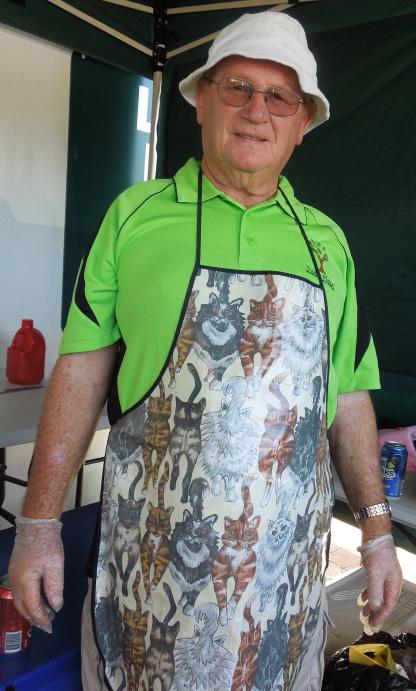
Wilfred (Bill) Cox 26-4-1928 – 11-12-2019

Bill Cox was born in Bath, England, and following the death of his mother, was placed at Nazareth House in Bristol. Bill was sent to Australia on the Strathnaver, arriving at Clontarf in March 1939. He later went to Tardun where he completed his Junior and learnt about farming. In 1950 he applied for a virgin block of land which he cleared, and farmed successfully until 1975.
In 1953 Bill married Gloria Butler and their close-knit family grew from four children who were raised on the farm, to nine grandchildren and 16 great-grandchildren. In his last years, he was devoted to caring for Gloria who sadly passed away on 11 November 2019, exactly one month before him.
Bill remained independent at home and was still driving his car until the day before he died peacefully after 24 hours in hospital with his family around him.
Written by Bill and Gloria’s daughter Anne Armanasco
Raymond McGowan 16-2-1938 – 11-9-2019
Ray McGowan arrived in Australia in 1947 as a child migrant and was sent to Castledare, Clontarf and Bindoon. In her eulogy at Ray’s funeral, Ann McVeigh said: “I knew Ray for about six years as a Tuart Place participant and knew him to be a perfect gentleman and kind human being. I loved his dapper way of dressing in Country and Western style, always immaculate and always with his lovely big hat. He was a big fan of Marilyn Monroe too.
Ray loved his Mondays at Tuart Place and the singing in particular. Ray would delight in singing Danny Boy, and I loved how everyone let Ray take the lead and sing his heart out. He was one unique person and I am so pleased to have met him.
When I last saw Ray in Fiona Stanley Hospital he told me how delighted he was to have met Jacqi, a hairdresser who volunteered every month at Tuart Place. He told me how Jacqi had accepted him as a member of her extended family. It was so wonderful to see, and I was so pleased for him. Somehow I think he looked on her as the daughter he didn’t have. I’m sure he knew he was loved by her family, and his family at Tuart Place”.
17
About our Board Tuart Place is governed by the Board of Forgotten Australians Coming Together (FACT) Inc.
The FACT Board comprises Australian-born care leavers and former child migrants, as well as professional members elected for their expertise and qualifications in areas such as law, accounting and management.
Tuart Place is a leader in co-production of support services with Australian care leavers, and peer leadership plays a pivotal role in service design.
All Board Members are elected as individuals and are valued for their qualifications, skills and life experience. Board Members do not represent the interests of any other organisation with which they may have an association.
FACT Inc Board of Governance 2020
Office Bearers
Vice-Chairperson Dale Lynch
Chairperson Cevrina Reed
General Board Members
Treasurer Ross Stagno Accountant
Kevin Collins Lyn McLaughlin
Ann McVeigh
John Ryall
Ann McVeigh started coming to Tuart Place seven years ago, and joined the FACT Board in early 2016. She is a longstanding campaigner for care leavers’ rights. The people of Tuart Place got to know Ann a little better during her powerful presentation in September 2019, as part of our 2019 ‘Meet a Board Member’ series.

“My name is Ann McVeigh. I am a child migrant who was sent to Australia with a false name and identity in 1950, aged five years young.
For 17 years I answered to the name of ‘Lucy’ and I had a false birth date as well – my school pals all call me Lucy which I don’t mind. I have on occasions been called Lucy Ann.
I consider myself very fortunate to have done well in life. My partner of 42 years was also a child migrant, having been at Fairbridge Farm in Pinjarra, and we have a son called Danny”.
During her talk, Ann described how a chance meeting in the late 1980s with Margaret Peterson (nee Watts), a fellow exresident of St Joseph’s Orphanage, ultimately led to the formation of ICAS - the Institutional Child Abuse Society:
“Margaret had just come out of hospital after having a breakdown when she received her personal files from the Child Welfare Department”.
Margaret told Ann that she was trying to break the silence around institutional abuse of children, and asked Ann to join her:
“With the help of the Welfare Department we set up an office in Claremont in the Wish Foundation offices. After Margaret’s story was published in The West Australian, we were invited to three radio stations for interviews. While on the Howard Sattler show, we were asked if we would take a few phone calls. What an eye opener! Most of the calls were from angry young men, who had been molested in Perth Orphanages.”
Margaret and I formed ICAS, and her story was read out in Parliament by Senator Jean Jenkins; and recorded by the World Court of Human Rights in New York.
Many years later, I came to Tuart Place quite by accident. Someone told me they had singing every Monday, so out of curiosity I went along. That was seven years ago and I think I have been coming here every Monday since.
It wasn’t only the singing that kept me coming, but the meeting up with school friends and making new friends that worked for me.
One of my newfound friends asked me if I was interested in being on the Board. I was hesitant at first, but thought I’d give it a go.
I am pleased to be part of the behind the scenes work of Tuart Place and part of a dedicated committee that has care leavers as its top priority.
I thank you all for the privilege of serving you all as a Tuart Place Board Member”. Ann McVeigh AN HISTORIC MOMENT IN TIME November 2009: The National Apology to care leavers in Canberra L-R (seated): Mary Smith (dec), Ann McVeigh, Kathy Savage, Sheilagh Pearce Standing: Barbara Jeanne Costello (dec), Jenny Macklin, Eddie Cogan (dec).
70 years of friendship keeps on going
by Paddy Cannon We attended Tony Dalton’s funeral in November last year and many, many Old Boys from Tardun, Clontarf, Bindoon and Castledare Homes turned up to pay tribute.
I wish to express my thanks to Dr Philippa White, Director of Tuart Place, who kindly attended the funeral too. Tuart Place has created an opportunity for all the members to look out for and care for each other. Unfortunately, over the past two years, seven of our Tuart Place family members have passed away. Each time, it felt like I was burying one of my brothers. The only family I had before I married in my late 20’s was my fellow orphan boys and girls from the Homes, we were one close family.
Thanks to all our members and special thanks to Peter Bent who has done so much caring for his fellow members over the years.
Thank you, Peter! From Paddy
Since its inception in 2012, Tuart Place has received a large proportion of its core operational funding from the State Government, and continues to receive essential financial support from the WA Department of Communities.
Equally important to the continuing operation of Tuart Place are the unconditional donations received from non-government organisations that formerly provided institutional care to children. In addition to State Government grants, Tuart Place receives unconditional financial contributions from Catholic past providers the Christian Brothers, the Sisters of Mercy and the Sisters of Nazareth, and from non-Catholic former providers of institutional care in Western Australia.
Financial support from all past providers is greatly appreciated by the people of Tuart Place, and is consistent with the Healing and Reconciliation agenda initiated by Tuart Place participants.
The importance of past providers funding support services is well recognised, and in its Report on Redress and Civil Litigation, the Royal Commission into Institutional Responses to Child Sexual Abuse observed that it is especially important for some survivors that support is ‘funded by the institutions responsible for the abuse’.
In addition to organisational donations, Tuart Place also receives donations from care leavers and from members of the general public. Some care leavers make donations to Tuart Place as a way of ‘giving back’ to the organisation, and supporting the common goal of Growing Strong Together.
To donate to Tuart Place
As a Public Benevolent Institution with Gift Deductible Recipient status, donations to Tuart Place are tax deductible. Donations can be made via PayPal on the Tuart Place website; by cheque, or Electronic Funds Transfer.
Account name: Forgotten Australians Coming Together Inc Bank: Commonwealth Bank Branch: Fremantle WA BSB number: 066-107 Account number: 1048-4327
Facebook donation drive
After seeing and donating to some Facebook Birthday Fundraisers, I decided to give it a go myself last year.
Basically, it involves posting a message on Facebook asking your Facebook friends if they would like to donate to your favourite charity for your birthday.
So I set one up for my favourite charity - Forgotten Australians Coming Together Inc (the governing body of Tuart Place).
I set my initial target at $200, and soon passed that amount. I ended up raising my target four times, eventually to $1000.
I am proud to say the final target was achieved, with a total of $1010 being raised. I was also pleased that every dollar was passed on to FACT Inc with no fees or charges being taken by Facebook.
Thanks to all those who donated to this very worthy charity.

Dale Lynch is a longstanding supporter of Tuart Place and a dedicated Board member of FACT Inc. Dale has been Vice Chairperson of FACT for the last 12 months.
Our photo shows Dale (on the right) at the 2019 Tuart Place Christmas Party, alongside Josh Cunniffe, Policy Advisor with the office of Minister Simone McGurk MLA; and FACT Chairperson Cevrina Reed.
Thank you Dale, for all you do. You make a tremendous contribution to Tuart Place and the FACT Board.
Friday 13 March to Sunday 15 March
This is a great chance to get away for the weekend and enjoy the company of others.
The historic Fairbridge Village is just one hour from Perth, located in a beautiful bushland setting, with plenty of wildlife and great facilities, including a swimming pool. Cost for the weekend is $60 per person to cover food and incidentals. A free bus will leave from and return to Maylands.
Accommodation fees for Fairbridge House are

covered by the Social Activities Group (SAG) from their very successful fundraising activities.
To find out more about the venue, visit http:// www.fairbridge.asn.au/
Get in quick to book your spot with Jo at Tuart Place.
Wanted: Volunteer bus driver
Do you have a C Class License and might you enjoy driving people to outings in a small bus? If so, please contact Jo at Tuart Place. We are looking for a back-up driver for the Social Activities Group.
Fundraiser Dance for St Bart’s Women’s Shelter
Saturday 21 March 2020 7-11pm at the North Perth Bowling Club Live music by Los Hombres de Blues $20 at the door Buy drinks at the bar. BYO nibbles Door and raffle prizes
A word from Dr Adele Chynoweth OAM
After the ‘Inside’ Exhibition I was the co-curator of the National Museum of Australia’s touring exhibition Inside: Life in Children’s Homes and Institutions. Since then, I have been contacted by Care Leavers who are concerned that their history is still unrecognised. As a result of these conversations, I am researching public history policy in Australia in relation to the Forgotten Australians and Former Child Migrants. ‘Public history’ is about ‘ordinary’ people being involved in history. It’s not just about the work of ‘professors’ or people with university degrees.
I thought it would be interesting to look back at which museums hosted the Inside exhibition and those that didn’t and also to understand why some museums took time in saying ‘yes’. I hope to discover the challenges that museums face and for me to collect evidence about this and not just jump to conclusions.
If I can put all this together, then perhaps this research could support a public discussion – a discussion about history and whose stories are told and where and
how, because I think that the way we respond to history, is also part of history, too. The Inside exhibition came about because of a recommendation in the Forgotten Australians Senate Report.
I know that Inside would have never happened without all the hard work of survivors – not only in working with museums to share their objects and narratives – but years before that, in the fight for justice that brought about government inquiries.
This is a grassroots, survivor-led movement. I am also hoping to document what Care Leavers did to support the Inside exhibition.
And to then ask, ‘What is the next step? Is one temporary exhibition enough?’
I am hoping to visit Perth later this year and meet with care leavers at Tuart Place. I would love to know what you think.
Every Monday: Singing group 10.30am-12 noon & the Big Monday Lunch at noon Every Monday: Counselling sessions available with psychotherapist Gordon Paton, by appointment Every Monday: Computers & mobile phone help with Jo’s team 10.30am-1pm Every Wednesday: Susy’s Support Group 10.15am-12 noon Every Wednesday: Computers & mobile phone help with Jo’s team. From 10.30am.
Every Thursday: Computers & mobile phone help with Jo’s team 10.30am - 12 noon
Every second Thursday: ‘Krafty Ladies’ craft session with Vera, from 11am Every Month: Family history and tracing with WA Genealogical Society expert Dr Lesley Silvester. 12.30-4.30pm, by appointment. Every 4 weeks: Free legal advice with lawyer Gary Dean. 1-4pm, by appointment. Every 4 weeks: Free beauty treatments with Natalia 11am - 3.30pm, by appointment.
John and Jan Owen and their fantastic Kimberley Dental Team will be back at Tuart Place on Monday 20 July 2020 from 9.00am.
Family members are also welcome to access free check-ups and basic dental treatments at this clinic.
Book an appointment with Vicky or just come in on the day.
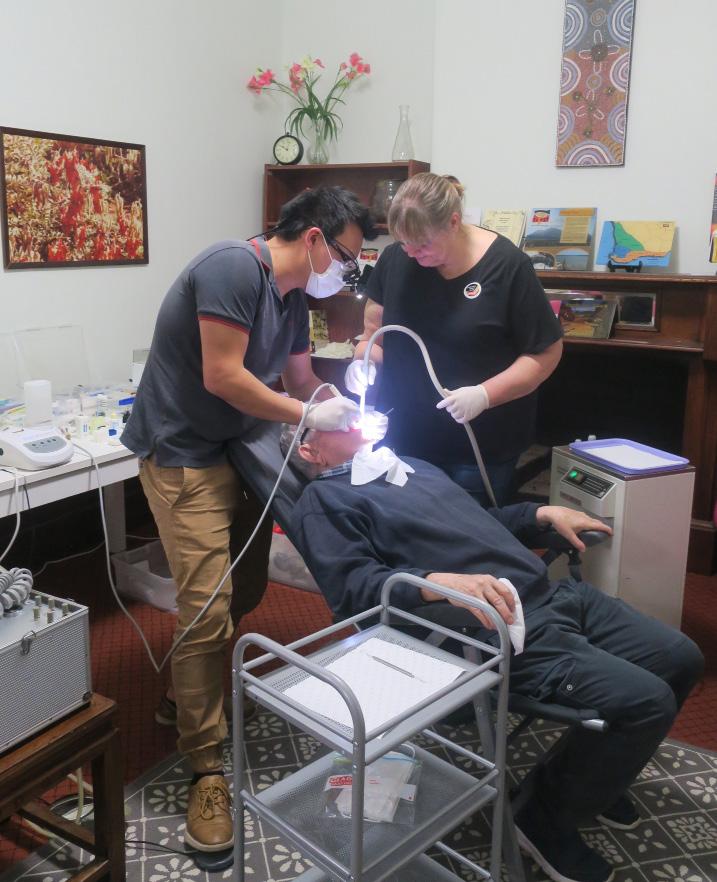
Free podiatry clinic
Family tracing with Lesley
Dr Lesley Silvester, our family tracing expert from the WA Genealogical Society (WAGS), visits Tuart Place each month to help people find out more about their family histories.
Lesley and her husband Mike also run ‘Time Trackers’, a busy genealogical firm that conducts family history research and specialises in British and Australian family history. Contact Vicky at Reception to book a one-hour session with Lesley on a Monday afternoon. This service is free of charge. Next sessions in 2020: • Monday 20 April 12.30–4.30pm • Monday 11 May 12.30–4.30pm • Monday 15 June 12.30–4.30pm • Monday 20 July 12.30–4.30pm Staff and supervised students from the faculty of Podiatric Medicine at the University of WA will be back at Tuart Place on Wednesday 25 March from 10am.
Once again they will provide free assessments and basic foot treatments. Free follow-up appointments are also available at the UWA Podiatry Clinic located at the Corner of Park and Crawley.
Computers: Get in the know with Jo and her team
Whatever your skill level (even if you’ve never turned on a computer before) you can get individual help.
Use the computer room, or bring in your iPad, mobile phone or digital camera and learn to browse the internet, send emails, scan photos and shop online. Please call in to see one of Jo’s computer volunteers on Mondays, Wednesdays and Thursdays from 10.30am.
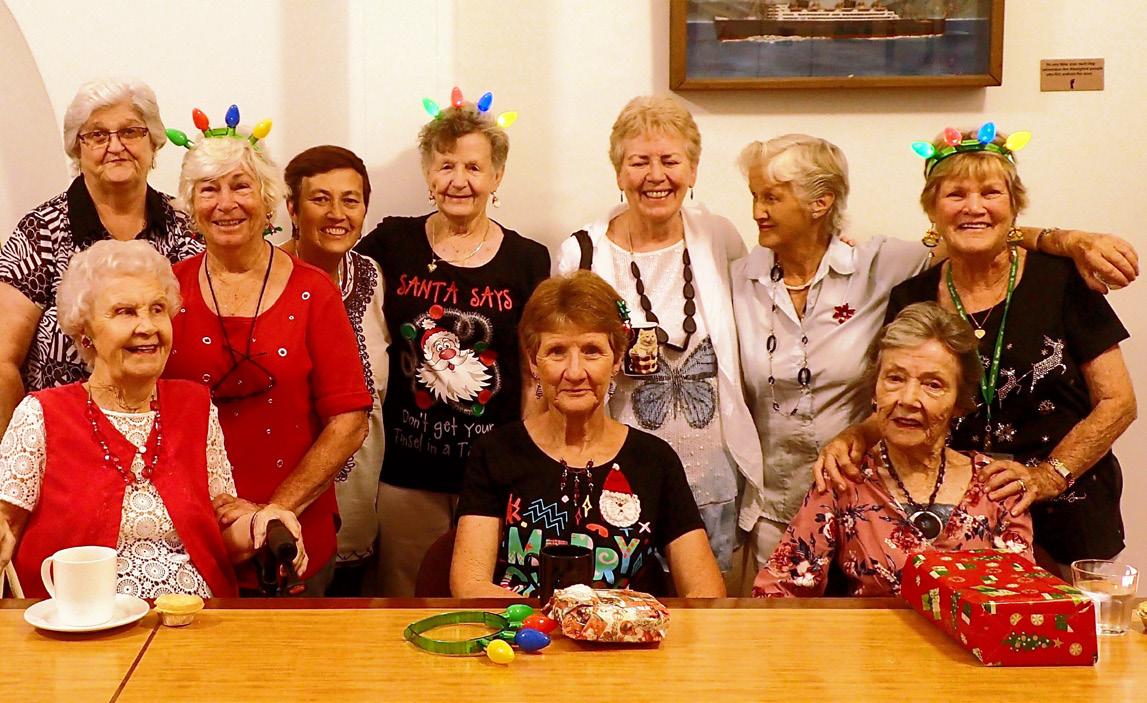
Krafty Thursdays Every second Thursday, from 11am
Feeling crafty? Why not come along and join in the every-second-Thursday craft sessions at Tuart Place. Bring your own craft ideas or help out with team projects.
Free legal advice at Tuart Place
With lawyer Gary Dean, by appointment. Call Vicky to book a consultation to discuss any general legal concerns or questions. Phone consults also available.
Counselling with Gordon Paton
Gordon Paton is a highly experienced psychotherapist, group facilitator and transactional analysis counsellor, and recently retired from the Harry Hunter Drug & Alcohol Rehabilitation Centre, where he worked for 14 years.
Gordon provides counselling, free of charge, to Tuart Place participants on Mondays.
Contact Vicky for an appointment with Gordon.

Like us on Facebook
Have you liked the Tuart Place Facebook page yet? It’s a great way to stay in touch.
We post lots of photos from events and also keep you up to date with relevant issues and forthcoming events. Find us at www. facebook.com/TuartPlaceFremantle













‘High Street Happenings’ is a new participant-produced newsletter that is published every two months. It’s full of interesting articles and photos of things that have happened at 24 High Street. You can pick up a printed version at Tuart Place or contact us with your email address to receive the electronic version.
Natalia Pronina is a qualified beauty therapist who volunteers at Tuart Place providing monthly beauty treatments to participants.
Treatments include: back, neck and shoulder massage, reflexology, foot massage, basic facials, eyebrow wax and tint, pedicures, and lip, chin & face waxing. Please book with Vicky.
Free beauty treatments with Natalia






